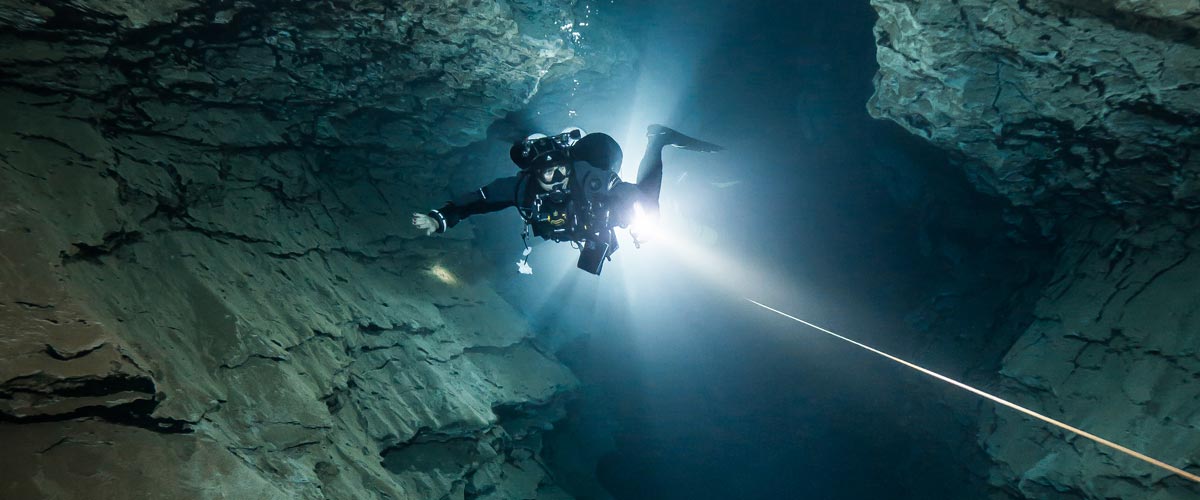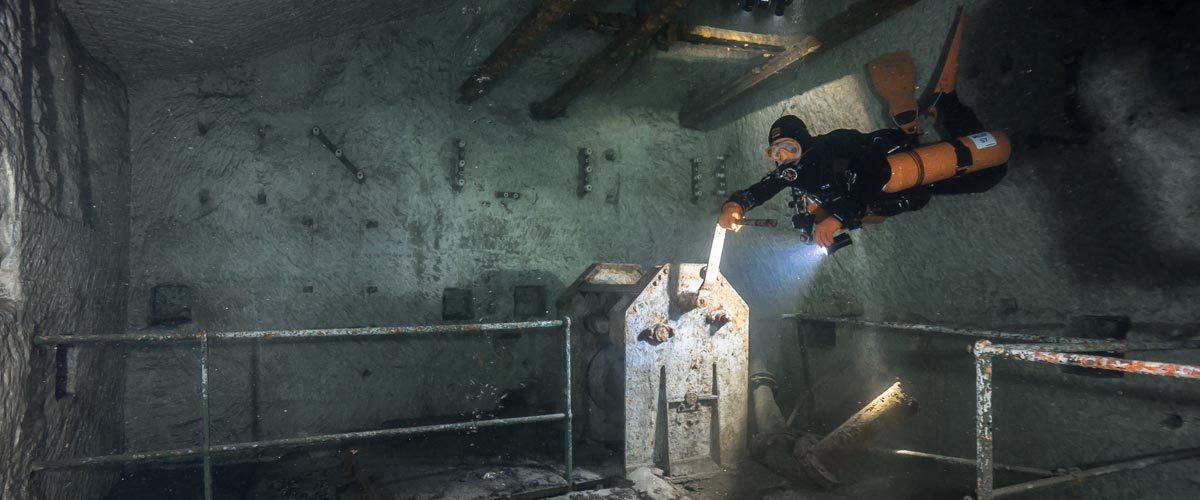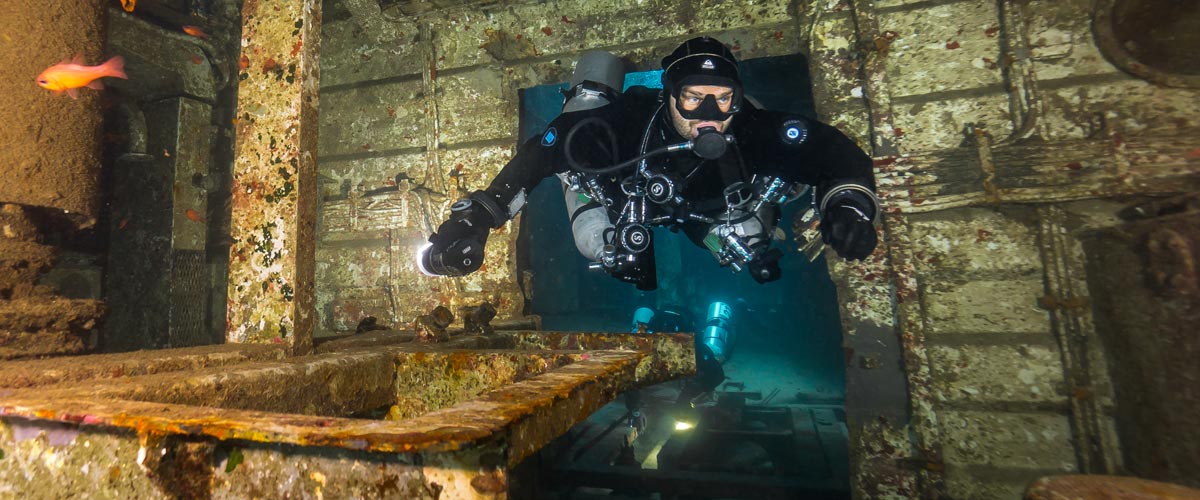Dive Training Blogs
Skill-Building Scuba Games
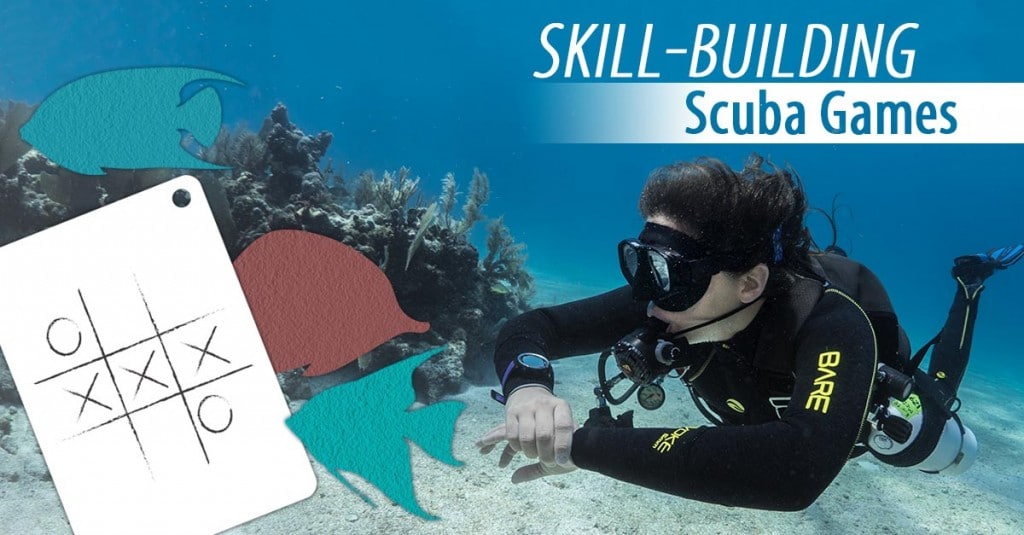
By Jesse Iacono
Contributors: Mark Phillips, Thomas Johnson, Christopher Richardson, Dillon Waters
Scuba divers are a fun-loving group of individuals; that’s the point of the activity! Most divers understand the importance of keeping their skill set fresh, but not everyone gravitates towards the idea of running through skill circuits during their precious underwater time. Skill-building games can be used by classes and certified buddy teams alike to bring some more fun into the process. Building in time for practice is key for every diver, so try some of these on your next dive, or jump in the pool with a buddy in between expeditions to keep yourself sharp.
GAME TIME
Hula Hoops
Rules:
Hula hoops are attached to weights by varying lengths of line to make them float at different depths. Divers must swim through the hoop without any part of their body or equipment touching it.
Skills:
Awareness – the diver becomes aware of their enlarged profile due to scuba equipment and realizes the space and position their body/equipment takes in the environment.
Buoyancy – the diver uses their breath to fine-tune their buoyancy as they pass through the obstacle.
Variations:
Different shapes can be made from pvc tubing.
Different sizes of hula hoops can be used.
Divers swim through the hoops performing different maneuvers – corkscrew spin, different fin kicks, etc.
Weight Hot Potato
Rules:
Weights of varying sizes are brought to the bottom. Divers arrange in a line or circle, the first diver picks up a weight, adjusts their buoyancy, and then hands the weight off to the next diver. As the weight moves down the line, the donating and receiving divers must adjust their buoyancy to stay neutral.
Skills:
Buoyancy – the diver adjusts to neutral buoyancy for varying amounts of weight and reacts quickly to sudden changes in buoyancy.
Control – the diver stays in formation while remaining neutral and stationary.
Task Loading – the diver’s other skills must be second nature as they are making quick adjustments.
Variations:
Each time a weight is handed off, another is picked up, giving every diver in the formation a different weight adjustment.
If a diver rises or sinks past a determined threshold, they are penalized or removed until one winner remains.
Frisbee/Torpedo
Rules:
An underwater frisbee or torpedo is passed from diver to diver while remaining neutrally buoyant.
Skills:
Buoyancy – the diver stays neutral and adjusts as necessary to catch the object.
Task Loading – the diver equalizes ears and buoyancy while chasing the object to different depths.
Variations:
The object is purposefully thrown out of reach, forcing the diver to chase it towards particular parts of the environment.
Underwater Football – teams must work together to deliver the object to the “end zone.” Touching the bottom results in a penalty and turnover of the object to the other team.
Ping Pong Balls
Rules:
Ping pong balls are brought under shallow water and held under each diver’s hands, either flat or slightly cupped downward, as they remain neutrally buoyant.
Skills:
Buoyancy – the diver primarily uses their breath for buoyancy adjustments due to the difficulty of operating their inflator/deflator with their hands occupied.
Use of Hands – the diver keeps their hands and arms still and in front of them to maintain control of the ping pong balls.
Variations:
Penalty or disqualification for any diver who loses a ball or closes their hand around it.
Divers navigate through an obstacle course while maintaining the ping pong balls.
Divers perform various kicks and change depths while maintaining the ping pong balls.
Divers hold a ping pong ball under an overturned spoon.
Push of War
Rules:
Two divers, either at the surface or underwater, face each other while positioned horizontally and link hands. The divers then kick to push towards each other and must push the other diver to the end of the pool or out of bounds to win.
Skills:
Fin Kicks – the diver uses efficient and powerful finning techniques to overpower the other diver.
Variations:
Winners of each round can take on new competitors until one pusher remains as victor.
A certain fin kick can be specified for both divers to use.
Fish Safari
Rules:
Fish shapes are cut out of old neoprene and attached to weights with line. Divers use underwater cameras to take pictures or videos of the targets.
Skills:
Photography – the diver uses a variety of techniques to build familiarity with the camera and explore new photo/video perspectives.
Variations:
Points awarded to best lighting, angle, grouping, etc.
Fish Hunt – divers bring pole spears and practice spearing fish.
Neutral Tic Tac Toe
Rules:
A slate or set of wet notes is passed between divers to play tic tac toe while neutrally buoyant.
Skills:
Buoyancy – the diver maintains neutral buoyancy while completing the exercise.
Task Loading – neutral buoyancy and other core skills become second nature as the diver works through problems and shifts their focus away from the surrounding environment.
Variations:
Change the game to another “pen and paper” style game.
Administer tests or problems with points off for losses of buoyancy control.
Bubble Rings
Rules:
Divers lay on the bottom and blow puffs of gas out of their mouth to try to make bubble rings that expand as they rise towards the surface.
Skills:
Regulator – the diver removes, replaces, and clears their regulator frequently.
Mask – due to breaks in the mask seal created by moving their face to blow the rings, the diver’s mask can partially fill with water and must be cleared.
Variations:
Divers remain neutrally buoyant while blowing vertical bubble rings.
Divers blow horizontal bubble rings by using hand movement to create a forward-moving vortex which traps gas expelled from the diver’s mouth or exhaust valve.
Gear Mess-up
Rules:
A scuba rig (tank, BC, regulator) is assembled incorrectly, having an agreed upon number of errors. The diver who assembles the equipment then puts it on and allows the other players to inspect them as if they were in the buddy check process for a specified amount of time. The other players must work together to identify all errors in the setup.
Skills:
Buddy Awareness – the diver shifts their focus to their buddy’s equipment and recognizes the amount of problems that can occur before entering in the water as well as the benefit of having their gear checked over by a buddy.
Equipment Familiarity – the diver familiarizes themselves with all parts of the equipment as well as problem identification and correction.
Variations:
Multiple rounds which present increasingly difficult errors to identify.
Teams write down issues and compete to get the most correct answers.
Multiple sets of gear are assembled, and the players move from station to station to find errors.
Obstacle Course
Rules:
Divers must navigate through a course that presents physical obstacles, stations that prompt certain activities, or both.
Skills:
The skills built from this game can vary greatly due to the opportunity to build just about anything into it. It can be as simple as moving through obstacles or as complex as combining all the games in this article.
Variations:
The variations are endless with this game and can apply to any level of skill – get creative!
To find out more about International Training, visit www.tdisdi.com.

Blogs
Intro to Tech: What is it about?
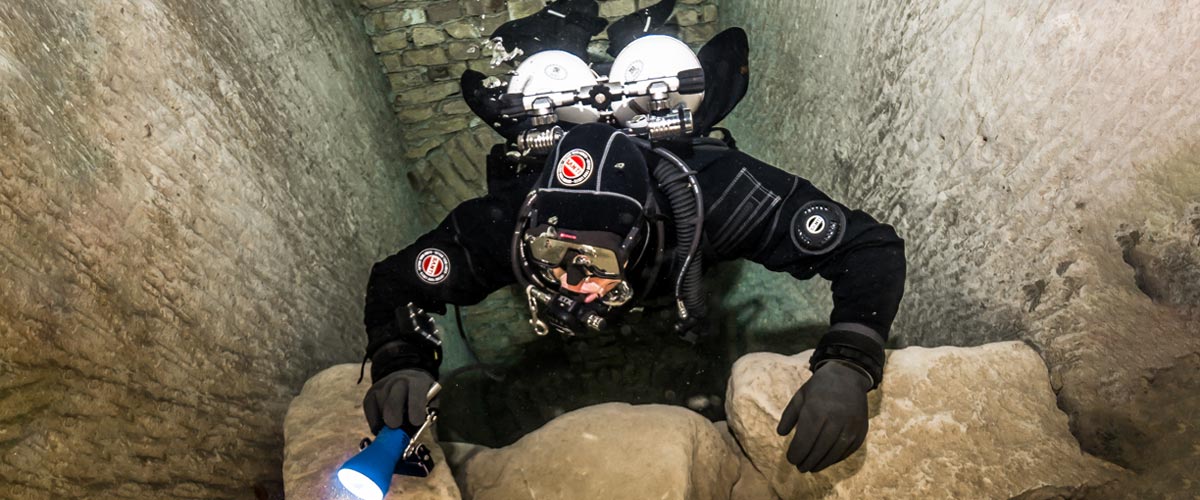
Article by José Pablo Mir
Pictures by Cezary Abramowski
The world of technical diving is exciting. It opens the door to new sites, depths, and bottom times. More importantly, it opens our minds to a new way of planning, facing, and experiencing dives, even those not purely technical.
Becoming a technical diver is a process, and like in other aspects of life, we should find the proper entry point that suits us best based on our knowledge and experience. The Introduction to Technical Diving course from TDI -the world’s largest and most recognized technical diving teaching organization- is the best option for divers who have yet to gain experience in the fundamental aspects of this new practice. The course’s content and its embrace of new techniques and technologies make it possible to acquire a solid foundation to learn and gain experience in this practice properly.
Becoming a technical diver is not something that happens overnight, whether deciding to become one or receiving a certification card stating we are now technical divers. It is a slow process extending farther away than any introductory course. It requires effort and dedication. But it will bring us satisfaction from day one -or two.
It is a matter of mentality
First, we must understand and accept that technical diving, involving greater depths, longer bottom times, exotic gases, virtual or real ceilings, and more, comes with higher levels of risk than the sport diving we have been practicing until now.
Although this discussion usually starts with a warning about risks, as I’ve done in the previous sentence, our practice is not a game of chance.
Technical diving is a rational activity that requires maturity and good judgment, and we will put everything into ensuring that each dive is a successful one -meaning we return from it safe and sound. With this understanding, we will strive to establish a mental attitude more aligned with our practice and its realities.
This new “technical diver” mindset we will develop will lead us to be more cautious in our executions, more analytical in our plans, more rational in our strategies, and more detailed in our procedures.
Experience will keep teaching us to know ourselves better, to keep our anxiety and other emotions under control, and to manage our impulses. Over time, our senses will sharpen, and we will be more attentive to the particulars of the situation we find ourselves in.
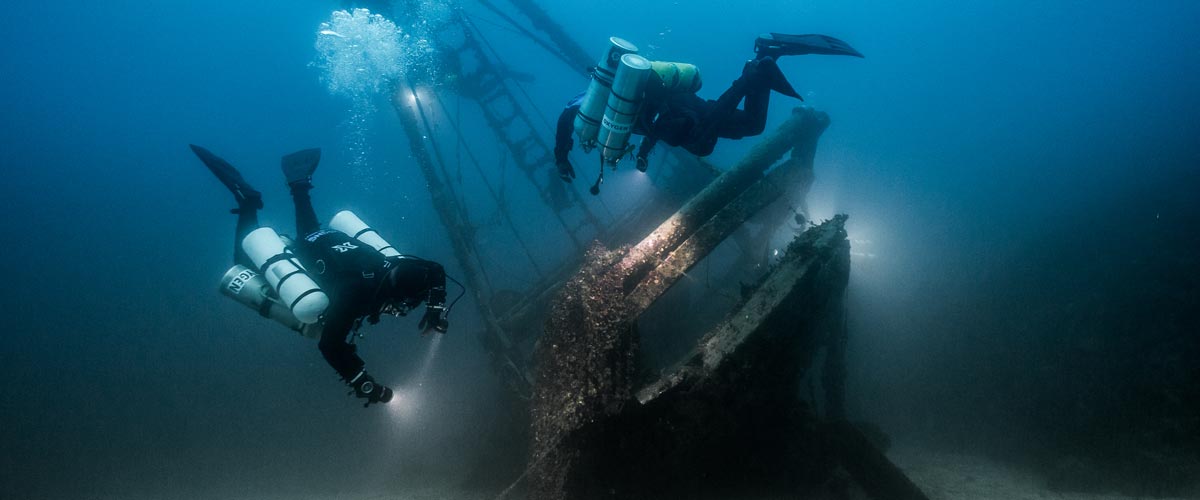
Strategies and procedures
Our strategies, those broad guiding lines tracing the path to follow, from how to approach planning to where, with what, and how we are willing to get there, will be more specific and more practical. Not because they magically become so, but because we will consciously and deliberately frame them that way.
We will establish clear, concise, and realistic procedures. Not only for the undesirable situations that may present themselves but also for those that are part of our dive objectives.
Even though, as technical divers, we often use equipment different from what we were previously accustomed to, it is essential to note that the gear does not make the diver. In a way, we could consider such equipment as the necessary tools to implement what our goal seeks to achieve, according to our strategies and procedures.
Technique plays an important role
We must put our greatest effort into learning and perfecting the different techniques we will be acquiring. Buoyancy, trim, propulsion, cylinder handling, deploying DSMBs and lift bags, valve drills, and more are essential skills we must begin to master to progress in our art. What we cannot do, when we need to do it, can harm us.
Our techniques must be effective and achieve the purpose for which they were devised. But they must also be efficient and require the least resources possible, including the time they take and the effort they demand. Effectiveness and efficiency will prevail over beauty and other considerations that may come to mind, although none of them should be mutually exclusive. A technique executed efficiently and effectively tends to have an inherent beauty.
Refining techniques is a lifelong mission. Some of them will be easy to master from the go; others, on the other hand, will be our life mission and will require many repetitions just to resemble the idea we have in mind of how they should be executed.
We must consider the environment
Our learning, the needs and musts of the practice we engage in, the experience we gradually gain, our strategies and procedures, and even our equipment and tools change with the environment.
Diving in the ocean, everything about us must be suitable for ocean dives. Conditions there rarely emulate those found in a pool, lake, or river. Variable winds and currents, greater depths, visibility conditions, other divers with uncertain skills around us, marine life, maritime traffic, distance from the coast, and many other factors add complexity and uncertainty.
It is never necessary to master the pool on the first day, but planning and aspiring to gradually cope with the ocean’s conditions is essential.
The cost of good training
We are aware that our resources are often scarce in relation to the possibilities of use we could give them if they were not. To a greater or lesser extent, we are part of the economic reality in which we are embedded.
Fortunately, the cost of good technical diver training is not an entry barrier. Comparing training and equipment costs, we see that the former are generally lower. Yes, lower cost for personalized service, essential to our future
performance and safety, than for a series of mass-produced products that are mere, albeit necessary, tools for an end.
The value of good training
The value of the training we received encompasses a range of characteristics, from emotional and methodological to technical and technological. TDI and its Introduction to Technical Diving course offer a deep and modern approach, with a teaching strategy that aims to create thinking divers, not merely obedient ones.
As technical divers, our knowledge is our primary tool. In this type of activity, what we don’t know can harm us.
Is this course optional?
Unfortunately, the fact that this Introduction to Technical Diving course is not a prerequisite for any subsequent training is an invitation to consider it optional. And we all know what usually happens to “optional” under budget constraints.
However, this course should be seen as optional only by those divers who are somehow familiar with the use of technical equipment, who have a mindset more in line with the requirements of this type of diving, who plan and execute the dives the proper “technical” way, who know their gas consumption rate, who are not intimidated by non-decompression tables, who feel comfortable using their dive computers, and know the techniques and have at least an acceptable level of buoyancy, positioning, and propulsion. Those can go straight to a more advanced training course, such as TDI’s Advanced Nitrox.
We must ask ourselves whether or not we are in that group.
Remember our goal: to have fun
Recreational diving is our passion. Jumping into the water carrying heavy equipment and having properly dotted our I’s and crossed our T’s have only one ultimate goal: fun. This is the activity we have chosen as a hobby. We must enjoy it; it must give us pleasure and make us vibrate.
Having a good time is not optional!
Blogs
Four opportunities to go pro in 2024 with Dive Friends Bonaire
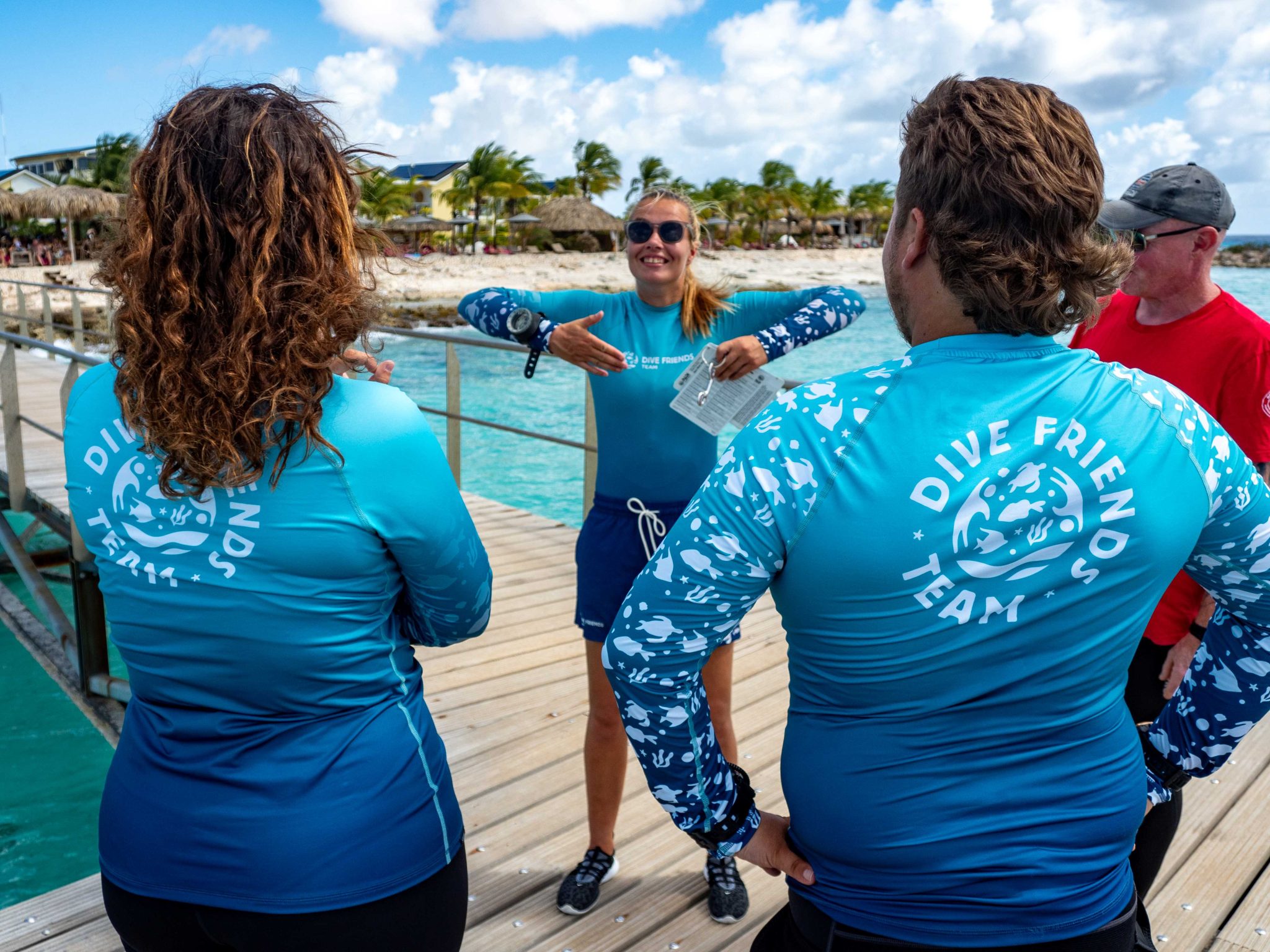
Dive Friends teaches the Instructor Development Course (IDC) several times a year to students who are eager to share their passion for diving with the world.
Dive Friends is known for the personal approach throughout the course. Their in-house course director will lead the students through every essential step, mentoring them to achieve their fullest potential as a dive instructor.
Applications for the following IDC start dates are now open:
- 12 April
- 5 July,
- 20 September
- 29 November
Partnership with Casita Palma
If the student opts for the IDC-Deluxe or IDC-Supreme package, their accommodation will be arranged for them at Casita Palma. This small and quiet resort is within walking distance from Dive Friends Bonaire’s main dive shop location and has everything you need to relax after an intense day of IDC training. Breakfast is included, so the student will always be fuelled and ready for their day.
Contact Dive Friends Bonaire’s Course Director Eddy for more information: coursedirector@divefriendsbonaire.com.
-

 News3 months ago
News3 months agoHone your underwater photography skills with Alphamarine Photography at Red Sea Diving Safari in March
-

 News3 months ago
News3 months agoCapturing Critters in Lembeh Underwater Photography Workshop 2024: Event Roundup
-

 Marine Life & Conservation Blogs2 months ago
Marine Life & Conservation Blogs2 months agoCreature Feature: Swell Sharks
-

 Blogs2 months ago
Blogs2 months agoMurex Resorts: Passport to Paradise!
-

 Blogs2 months ago
Blogs2 months agoDiver Discovering Whale Skeletons Beneath Ice Judged World’s Best Underwater Photograph
-

 Gear Reviews3 months ago
Gear Reviews3 months agoGear Review: Oceanic+ Dive Housing for iPhone
-

 Marine Life & Conservation2 months ago
Marine Life & Conservation2 months agoSave the Manatee Club launches brand new webcams at Silver Springs State Park, Florida
-

 News3 months ago
News3 months agoWorld’s Best Underwater Photographers Unveil Breathtaking Images at World Shootout 2023















